Understanding the Psychological Toll of Chronic Illness
Chronic illnesses pose not only physical challenges but also profound psychological hurdles. Patients often face anxiety, depression, and adjustment disorders triggered by diagnosis and the ongoing management of their conditions. The complex interplay between physical symptoms and mental health necessitates comprehensive therapeutic support to improve quality of life and health outcomes. This article explores how different types of therapy help patients cope, highlighting the importance of integrated mental health services in chronic illness care.
The Scope of Comprehensive Mental Health Services for Chronic Illness Patients
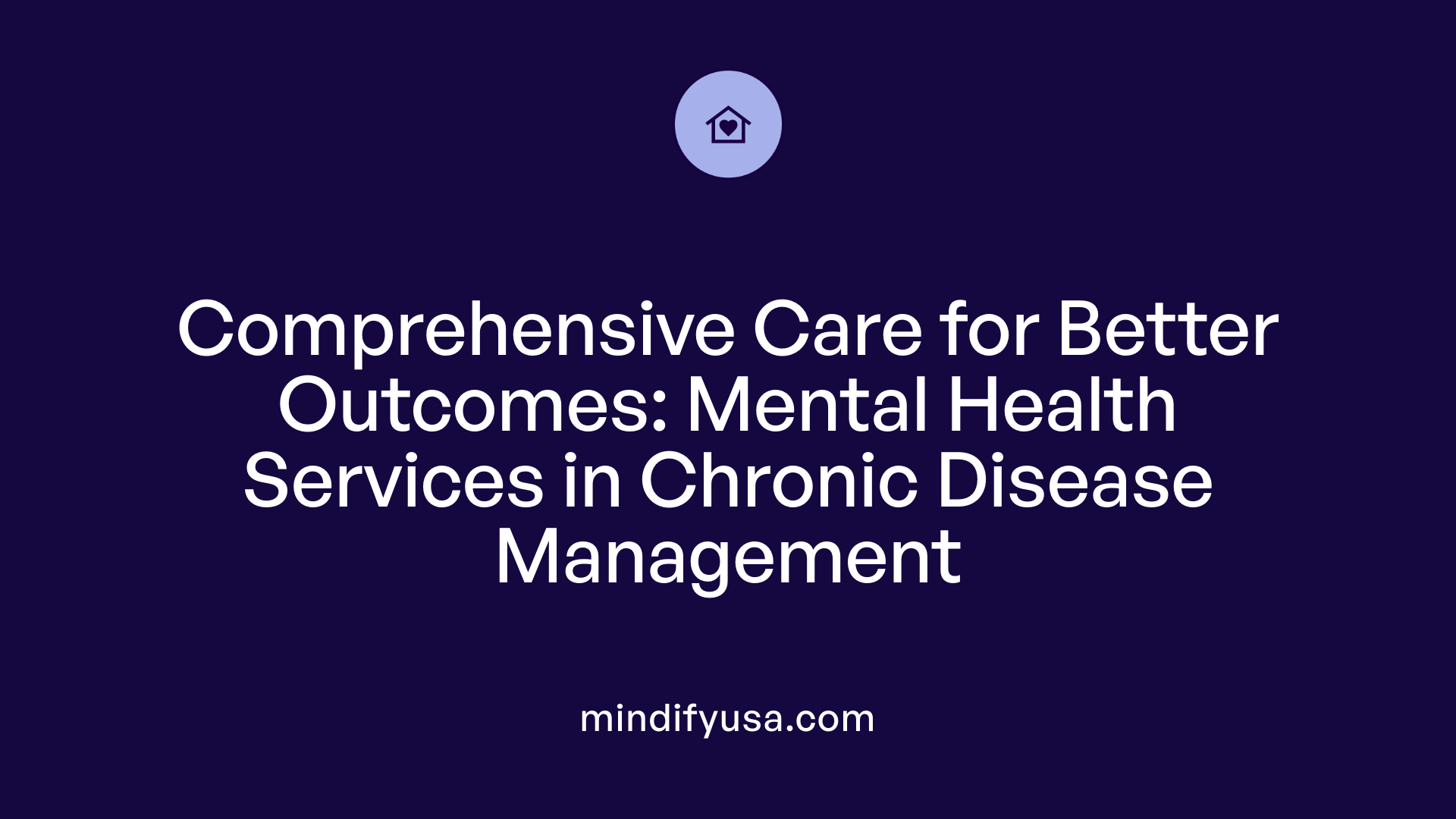
What types of mental health services are typically included in comprehensive care?
Comprehensive mental health services for individuals with chronic illnesses extend well beyond basic treatments. They include diagnosis, counseling, and psychotherapy tailored to conditions like anxiety and depression, which commonly accompany chronic diseases. Psychiatric evaluations and medication management also form essential parts of this care, providing a complete approach to managing mental health symptoms.
Additionally, crisis intervention and case management ensure patient safety and consistent care. Community-based services improve accessibility, particularly for those managing complex health needs. Integration into primary care settings enables early screening and treatment coordination with physical health management.
How is integration into primary care achieved?
Integrating mental health services within primary care involves combining mental health screening, diagnosis, and treatment directly within a patient's general healthcare visits. This collaborative care model features teamwork among primary care providers, care managers, and psychiatric consultants. This unified approach allows timely identification of mental health concerns like depression and anxiety, which may worsen chronic illness outcomes, and supports holistic treatment planning.
What approaches address social determinants of health in this context?
Comprehensive mental health care also tackles broader social determinants by coordinating with sectors such as education, housing, and social services. This creates supportive environments that address underlying factors impacting mental well-being, such as social isolation or economic hardship. Programs emphasize prevention, wellness promotion, and access to community resources, embracing a multidimensional approach essential to improving mental health outcomes in chronic disease populations.
| Service Component | Description | Role in Chronic Illness Care |
|---|---|---|
| Diagnosis and Assessment | Psychiatric evaluations and screenings for mood disorders and anxiety | Enables timely mental health identification |
| Psychotherapy and Counseling | CBT, ACT, support groups, and individual therapy | Improves coping, reduces depression and anxiety |
| Medication Management | Prescribing and monitoring psychiatric medications | Controls symptoms, supports mental and physical health |
| Crisis Intervention | Immediate response to acute mental health episodes | Ensures patient safety and continuity |
| Case and Community Management | Coordination of care and resource linkage | Enhances access and sustained support |
| Integration with Primary Care | Collaborative care involving general practitioners and mental health specialists | Early detection, holistic treatment planning |
| Social Determinants Focus | Linkage to social services addressing housing, education, and social support | Addresses environmental factors influencing mental well-being |
Effective Psychological Therapies for Anxiety and Depression in Chronic Illness
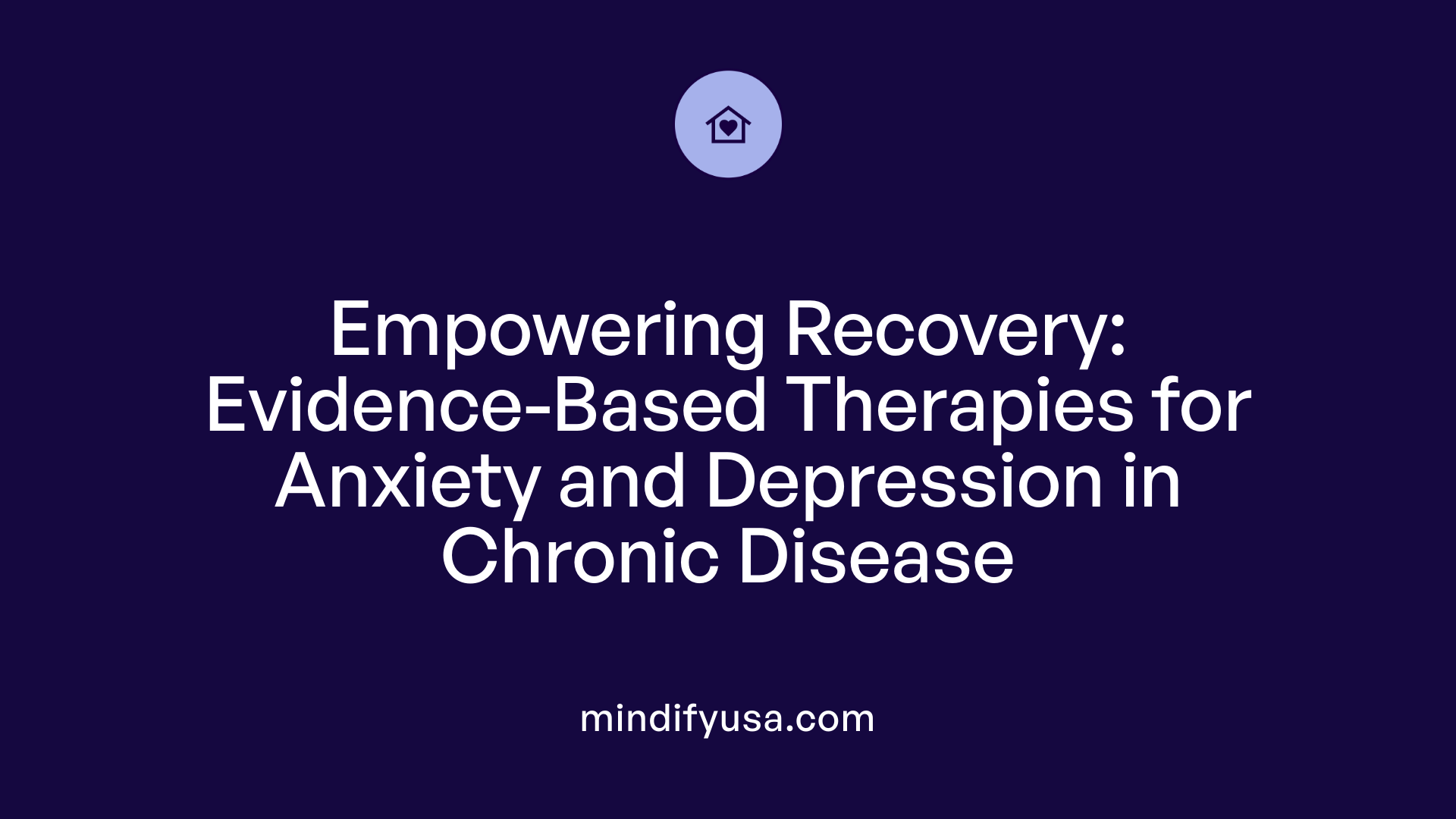
How are anxiety and depression generally treated within mental health services?
Anxiety and depression, particularly common among individuals with chronic illnesses, are treated using a multifaceted approach that includes psychological therapies, medication, and lifestyle modifications.
CBT and its Variants
Cognitive-behavioral therapy (CBT) and related therapies are among the most studied and effective psychological treatments. CBT helps individuals identify and change negative thought patterns, manage anxiety-provoking situations, and develop coping strategies. Variants like exposure therapy and behavior therapy similarly target emotional regulation and behavioral change. These therapies have been shown to significantly reduce symptoms of depression and anxiety.
Medication Combined with Therapy
For many, medication such as antidepressants (SSRIs, SNRIs) or anxiolytics is prescribed alongside therapy, especially in moderate or severe cases. Combining medication with psychological interventions offers a more comprehensive approach, addressing both biochemical and cognitive-behavioral aspects of mental health. Treatment plans are tailored to an individual's symptoms, medical history, and preferences.
Mindfulness and Behavior Therapies
Mindfulness-based techniques, including Acceptance and Commitment Therapy (ACT), have demonstrated benefits in fostering psychological flexibility, acceptance, and improved self-management. These approaches help reduce emotional distress related to chronic illness, such as pain and anxiety, by encouraging living in the present moment and building resilience.
Treatment Tailoring and Support
Tailoring treatments to individual needs, including homework assignments, relaxation techniques, cognitive restructuring, and goal setting, enhance effectiveness. Support groups and education further empower patients, promoting understanding of their conditions and building social support networks.
Lifestyle Modifications
Lifestyle factors play a vital role in mental health recovery. Regular physical activity (3–5 days a week), healthy diet, proper sleep hygiene, meditation, and stress management techniques complement therapeutic interventions. These habits improve mood, reduce inflammation, and foster overall psychological well-being.
Together, these combined strategies form an integrated approach that improves adaptation, reduces emotional symptoms, and enhances quality of life for those living with chronic illnesses.
Psychosocial Interventions: Early Adaptation and Coping Strategies
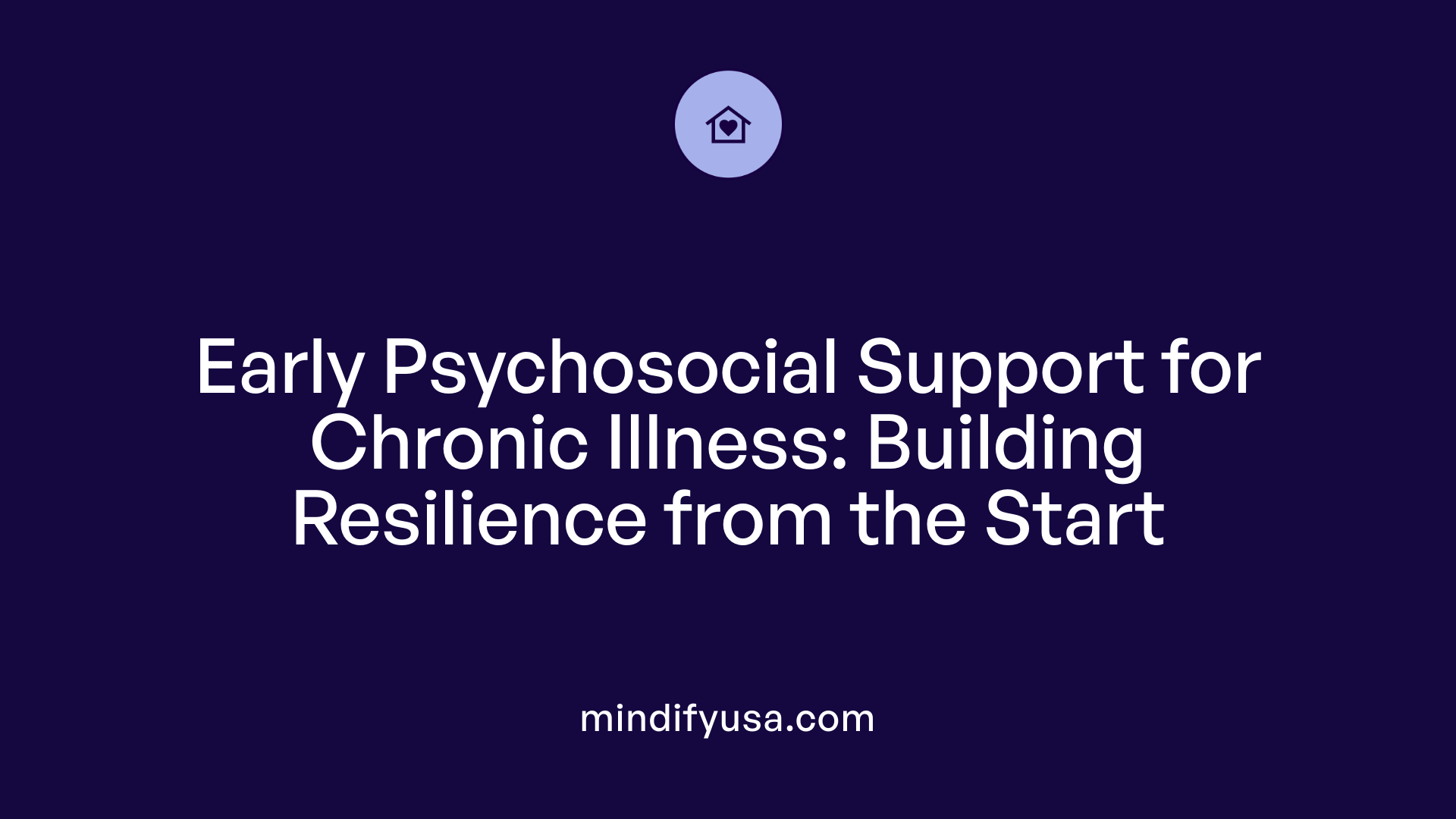
Why are psychosocial interventions important during the early stages of chronic disease diagnosis?
The initial diagnosis of a chronic illness often leads to emotional distress, anxiety, and uncertainty. Psychosocial interventions play a vital role at this early stage by supporting patients in adapting to their new health realities, improving psychological and physical health outcomes.
How do psychosocial interventions facilitate adaptation?
Adaptation is supported through therapy techniques that help patients process their emotions and develop coping skills. These interventions include cognitive restructuring, acceptance, finding meaning, and goal setting, all crucial for mental adjustment.
What is cognitive restructuring, and how does it help?
Cognitive restructuring is a therapeutic strategy that assists patients in identifying and modifying unhelpful or negative thought patterns. By changing these thought processes, individuals can reduce feelings of anxiety and depression associated with chronic illness and foster healthier perspectives.
How do acceptance and finding meaning contribute to coping?
Acceptance and Commitment Therapy (ACT) encourages patients to accept their condition and embrace psychological flexibility. Finding meaning helps individuals make sense of their experience, reducing distress and improving emotional resilience.
What role does goal setting play in psychosocial care?
Goal setting empowers patients by creating achievable health and personal objectives. This focus enhances motivation, self-efficacy, and provides a structured pathway to manage their condition effectively.
Through education, communication development, relaxation techniques, and active psychological strategies, these interventions provide comprehensive support that improves adaptation during the critical early period of chronic illness diagnosis.
Therapeutic Approaches Enhancing Psychological Flexibility and Resilience
What is Acceptance and Commitment Therapy (ACT) and how does it support patients?
Acceptance and Commitment Therapy (ACT) is a psychosocial intervention grounded in relational frame theory, emphasizing acceptance and psychological flexibility. It helps individuals adjust to chronic illness by encouraging them to accept difficult feelings and thoughts instead of avoiding them. This fosters resilience and better coping, enabling patients to live meaningfully despite their health challenges.
How do Positive Affect Interventions (PAI) improve mental health?
Positive Affect Interventions aim to boost positive emotions and resilience. By cultivating emotions like joy, gratitude, and hope, PAI helps improve overall mental health. These interventions have shown benefits in increasing patients’ positive affect, which can enhance their ability to manage chronic illnesses more effectively.
How does uncertainty management assist patients with chronic diseases?
Uncertainty management interventions focus on improving communication skills and helping patients handle the unpredictability related to their illness. This approach reduces distress by teaching strategies for coping with ambiguity about disease progression and treatment outcomes, thereby lowering anxiety and improving psychological adjustment.
What role do relaxation and self-efficacy techniques play in psychosocial therapies?
Relaxation techniques, such as meditation and breathwork, help decrease stress and physical tension, which commonly accompany chronic diseases. Self-efficacy techniques empower patients by strengthening their belief in their ability to manage health challenges and achieve goals. Together, these approaches support both mental wellbeing and active disease self-management.
These therapeutic methods collectively foster psychological flexibility, bolster positive emotions, and equip patients with practical skills, ultimately improving adaptation and quality of life during the early stages of chronic disease diagnosis.
Group Therapy and Social Support: Reducing Isolation and Enhancing Coping
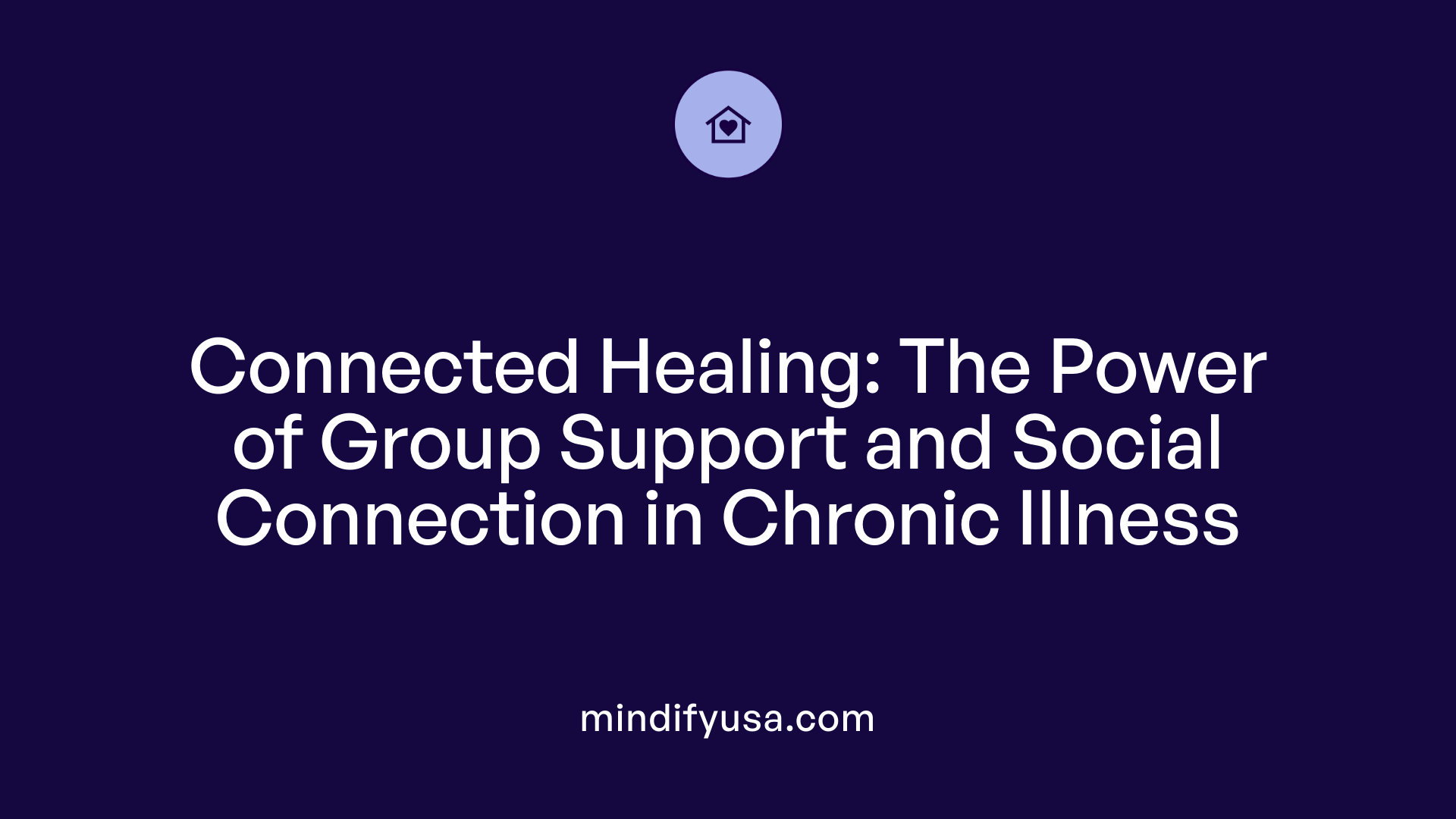
Benefits of Group Psychotherapy for Chronic Illness
Group psychotherapy has significantly expanded over the last three decades as an effective intervention for individuals with chronic medical conditions. These group sessions provide patients with a unique forum to connect with others facing similar health challenges, fostering a sense of belonging and reducing feelings of isolation. Participants often report improved coping skills and emotional adaptation as a result of shared experiences and mutual support.
Supportive-Expressive Group Therapy
One well-established model, Supportive-Expressive Group Therapy (SEGT), addresses critical themes such as medical status, coping strategies, family communication, healthcare provider relationships, self-image, and mortality. The group dynamic encourages emotional expression while promoting problem-solving and meaning-making. This approach has been shown to reduce pain perception and psychological distress, improving overall quality of life for patients dealing with serious illnesses, including metastatic breast cancer.
Family and Couples Counseling
In addition to group therapy, family and couples counseling offer valuable support frameworks that help strengthen communication and resolve conflicts that may arise due to chronic illness. These sessions can decrease feelings of isolation and foster a more supportive home environment, which is crucial for long-term adaptation and mental well-being.
Reducing Psychological Distress and Enhancing Social Integration
Group and social support interventions work synergistically to alleviate psychological distress such as anxiety and depression. By promoting social integration and connectedness, these therapies empower patients to navigate the emotional challenges of their conditions more effectively. The expansion of these therapeutic options reflects a growing recognition of the need for integrated care that addresses both the physical and psychological facets of chronic illnesses.
| Intervention Type | Main Focus | Benefits |
|---|---|---|
| Group Psychotherapy | Coping, emotional support, peer connection | Reduced psychological distress, increased quality of life |
| Supportive-Expressive Group Therapy | Emotion expression, coping skills, meaning-making | Pain reduction, improved family/provider relationships |
| Family and Couples Counseling | Communication, conflict resolution | Stronger relationships, decreased isolation |
| Social Support Groups | Sharing experience, emotional support | Enhanced social integration, resilience |
Integrated Care Models: Bridging Mental and Physical Health for Holistic Management
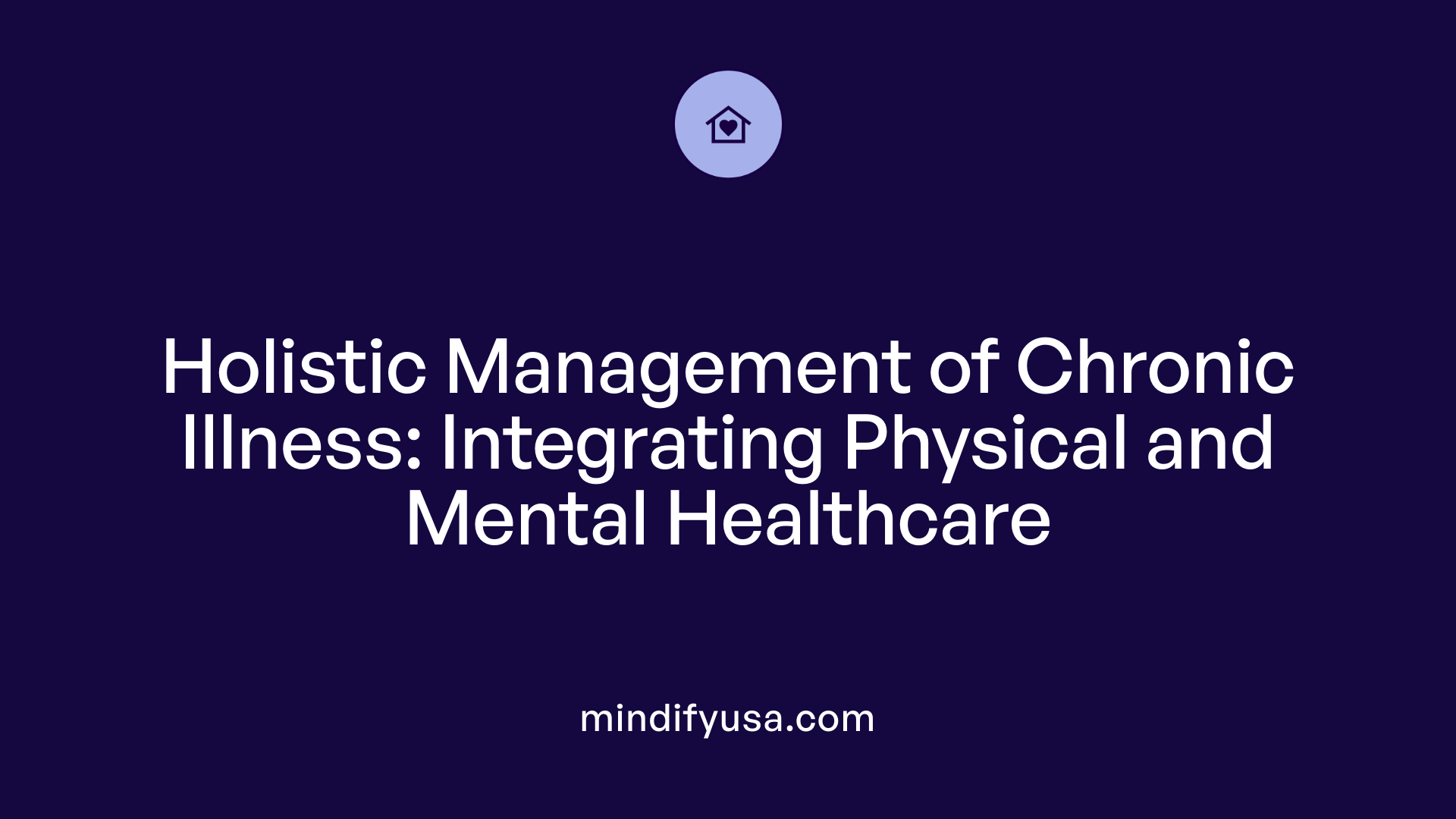
What is Integrated Care in Chronic Illness?
Integrated care involves the coordination of mental and physical health services to provide holistic management for individuals living with chronic illnesses. This approach acknowledges the complex, bidirectional relationship between chronic physical conditions and mental health disorders like depression and anxiety.
How Does a Collaborative Care Approach Work?
The collaborative care model brings together primary care providers, care managers, and psychiatric consultants to work as a team. This teamwork facilitates early depression screening, timely referrals, and ongoing mental health support alongside physical health treatments. Such integration ensures patients receive comprehensive care tailored to their unique needs.
Benefits of Integrated Care for Health Outcomes
Evidence shows that integrating mental health into chronic illness treatment improves both psychological and physical outcomes. Patients experience better management of depression and anxiety, which in turn can mitigate worsening of chronic disease symptoms. Integrated care also enhances self-efficacy, quality of life, and adherence to medical regimens.
Components of Comprehensive Treatment Models
These models typically include psychotherapy modalities such as Cognitive-Behavioral Therapy (CBT), Acceptance and Commitment Therapy (ACT), medication management, stress reduction techniques, and support groups. Mind-body practices and group therapy also play important roles. By addressing emotional, behavioral, and physical aspects, comprehensive models promote adaptation and resilience in patients.
Integrated care represents a humanized, effective strategy to address the intertwined challenges of chronic illness and mental health, fostering better overall health and well-being.
Practical Self-Care Strategies and When to Seek Professional Help
What Stress Management Techniques Can Help?
Managing stress is vital for individuals living with chronic illnesses as it directly impacts both mental and physical health. Effective techniques include mindfulness practices like meditation, breathwork, and yoga that help alleviate symptoms associated with stress and anxiety. Adopting relaxation methods such as deep breathing exercises and progressive muscle relaxation can also enhance emotional regulation. Healthy lifestyle choices—balanced diet, proper sleep hygiene, and engaging in pleasurable hobbies—play a fundamental role in reducing stress levels. Developing communication and problem-solving skills through therapy can further strengthen one’s capacity to cope with illness-related challenges.
How Does Physical Activity Benefit Mental and Physical Health?
Regular physical activity, performed three to five days per week, offers multiple benefits for people with chronic diseases. Aside from improving physical health markers, such as reducing inflammation and enhancing circulation, exercise is proven to elevate mood and reduce symptoms of depression and anxiety. It also contributes to better sleep quality and increased energy levels, supporting overall well-being. Physical movement can foster a sense of self-efficacy, enhancing individuals' belief in their ability to manage their health effectively.
When Should Someone Seek Professional Help?
Recognizing when to seek help is crucial for maintaining mental health during chronic illness. Signs indicating the need for professional support include persistent sadness, hopelessness, irritability, anxiety, difficulty concentrating, sleep problems, appetite changes, and thoughts of suicide. If emotions interfere substantially with daily life or self-care, it is important to reach out to healthcare providers. Primary care providers can offer referrals to mental health professionals such as psychologists, psychiatrists, or social workers.
What Therapy Options Are Available, Including Online Services?
A variety of therapy types address mental health needs related to chronic illness. Cognitive-Behavioral Therapy (CBT), Acceptance and Commitment Therapy (ACT), Dialectical Behavior Therapy (DBT), and motivational interviewing are all effective approaches. Therapy can be provided individually, in families or couples, or in groups, each offering unique benefits. Online therapy platforms provide flexible and accessible options that are often as effective as in-person sessions. Participation in clinical trials may also offer access to new interventions backed by research.
How Can Support Groups Enhance Coping?
Support groups create safe environments where individuals can share experiences and reduce feelings of isolation. They promote social integration, strengthen communication skills, and provide emotional validation. Groups tailored to chronic illness coping focus on problem-solving, acceptance, and meaning-making, enhancing resilience. Both face-to-face and online support groups are widely available and cater to different preferences and needs.
Together, these self-care strategies and professional supports form a comprehensive approach to managing the emotional and psychological challenges of chronic illnesses, improving quality of life and health outcomes.
Therapy as a Cornerstone of Chronic Illness Coping
Chronic illnesses deeply intertwine with mental health challenges, making therapy an essential component of effective management. Through a comprehensive approach integrating diverse therapeutic modalities—from cognitive-behavioral strategies to group therapy and acceptance-based methods—patients gain crucial tools to adapt, reduce psychological distress, and enhance well-being. Early intervention, collaborative care, and self-care empower individuals to navigate complex emotional landscapes associated with chronic illness. Ultimately, therapy not only alleviates symptoms of anxiety and depression but also nurtures resilience, enabling patients to reclaim control over their lives and health.
References
- Psychosocial interventions for adults with newly diagnosed ...
- Understanding the Link Between Chronic Disease and ...
- Chronic Illness: Sources of Stress, How to Cope
- Managing your mental health while coping with chronic ...
- The Impact of Chronic Illness on Mental Health
- Discover the Benefits of Therapy for Mental Health
- How Chronic Illness and Mental Health Intersect
- Group Therapy for Patients With Medical Illness
- Managing Mental Health While Coping with Chronic Illness
- Managing and treating anxiety





































































































